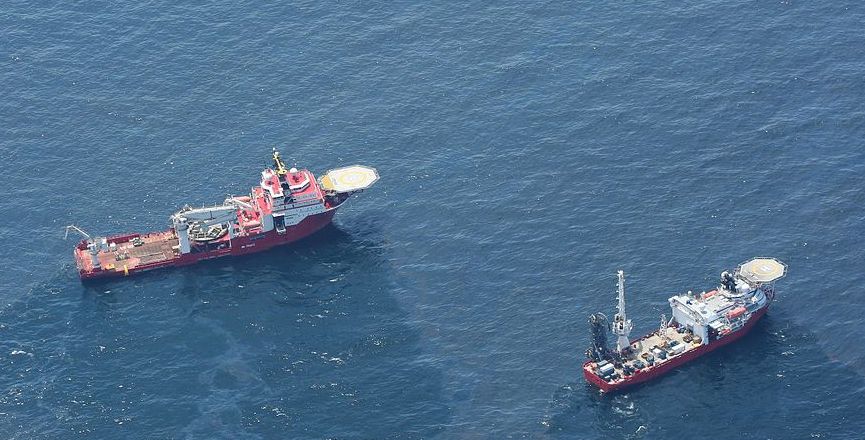Prime Minister Justin Trudeau’s special envoy on NAFTA talked up the ‘free trade’ deal in Washington yesterday.
The Canadian Press reports, “Former prime minister Brian Mulroney offered a spirited defence of NAFTA in Washington on Tuesday [to the U.S. Senate committee on foreign relations]. Mulroney was warmly greeted by the majority of U.S. senators on the committee, who were largely united in their belief that while NAFTA needs to be modernized, the deal itself had been a boon to their country and North America.”
Furthermore, 36 Republican Senators have now written U.S. president Donald Trump asking that he “keep NAFTA in place, but modernize it” because that would serve to “expand energy exports to maximize domestic energy production” and along with other measures (including his corporate tax cuts) “fuel historic growth.”
NAFTA, which came into force on January 1, 1994, includes an energy proportionality provision. The Financial Post explains, “[Article 605] means Canada and the U.S. cannot reduce access to each other’s oil, natural gas, coal, electricity or refined petroleum products without an equivalent reduction in domestic access to the same product. So if Canada wanted to cut oil exports to the U.S. by 20 per cent it would have to cut domestic supplies by 20 per cent as well, except in specific circumstances such as the need to protect national security.”
Author-activist Gordon Laxer has commented, “The clause was crafted to allow petro-corporations, most of them foreign, to export as much Canadian oil and natural gas to the U.S. as possible. It was written before the end of the age of cheap oil and before we recognized the looming catastrophe of climate change.”
National Post columnist Claudia Cattaneo recently raised the argument that “the Americans fought hard for the ‘proportionality clause’ in the aftermath of the National Energy Program, which prioritized Canadian energy security, because they didn’t want to face similar ‘handcuffs’ in the future.”
Mulroney’s spin on this yesterday highlighted, “NAFTA did not happen by accident. In large measure it was the result of the leadership and vision of three great American presidents: Ronald Reagan, George Herbert Walker Bush and Bill Clinton.”
In December 2017, Canada’s chief NAFTA negotiator Steve Verheul stated the government wants to “modernize” the energy chapter and highlighted, “We’re also looking at bringing Mexico into the energy chapter because they were not part of it in the original NAFTA when it was negotiated.”
The Mexican government also wants to be brought into the energy chapter having implemented an ‘energy reform’ law that seeks to attract billions in foreign capital to increase oil production to as much as 4 million barrels per day by 2025.
U.S. Energy Secretary Rick Perry (a former Governor of Texas) appears to want this too and has stated Mexico is a “a very, very important partner” on energy.
Reuters has also reported, “Trade experts both in the United States and Mexico have said that increasing energy trade and investments through NAFTA would help reduce the $64 billion U.S. trade deficit with Mexico that irritates Trump, partly through increased U.S. gas and oilfield equipment sales to Mexico.”
Furthermore, Bloomberg has reported, “Industry officials from all three countries are eyeing the deal as a way to seek more regulatory certainty and the harmonization of industry standards. Canada, for example, may use the negotiations to push for more predictability surrounding the approval of pipelines and power lines crossing into the U.S., following years of squabbling over TransCanada Corp’s proposed Keystone XL project.”
The Trudeau government’s support for all this is not surprising given environment minister Catherine McKenna’s advisory council on NAFTA includes a former president of Shell Canada who publicly supported the now defunct 1.1 million barrel per day Energy East tar sands pipeline, while foreign affairs minister Chrystia Freeland named the president of Gaz Métro to her NAFTA advisory council. The Globe and Mail reported last spring that “One Canadian official, speaking on condition of anonymity, said bringing Mexican oil and gas under NAFTA would be an attractive prospect in trade talks.”
The seventh round of NAFTA talks is now scheduled to be held in Mexico City from February 26 to March 6.
The Council of Canadians opposes the energy proportionality provision in NAFTA, highlights that entrenching Mexico’s neo-liberal oil and gas laws in NAFTA would only worsen the climate crisis, says that trade disciplines (like the investor-state dispute settlement provision) should not be allowed to impede climate action, and asserts the need for a 100 per cent clean energy economy by 2050.
Brent Patterson is the Political Director of the Council of Canadians.
This story originally appeared on the Council of Canadians blog.
Image: USEPA/Wikimedia Commons
Like this article? rabble is reader-supported journalism. Chip in to keep stories like these coming.




